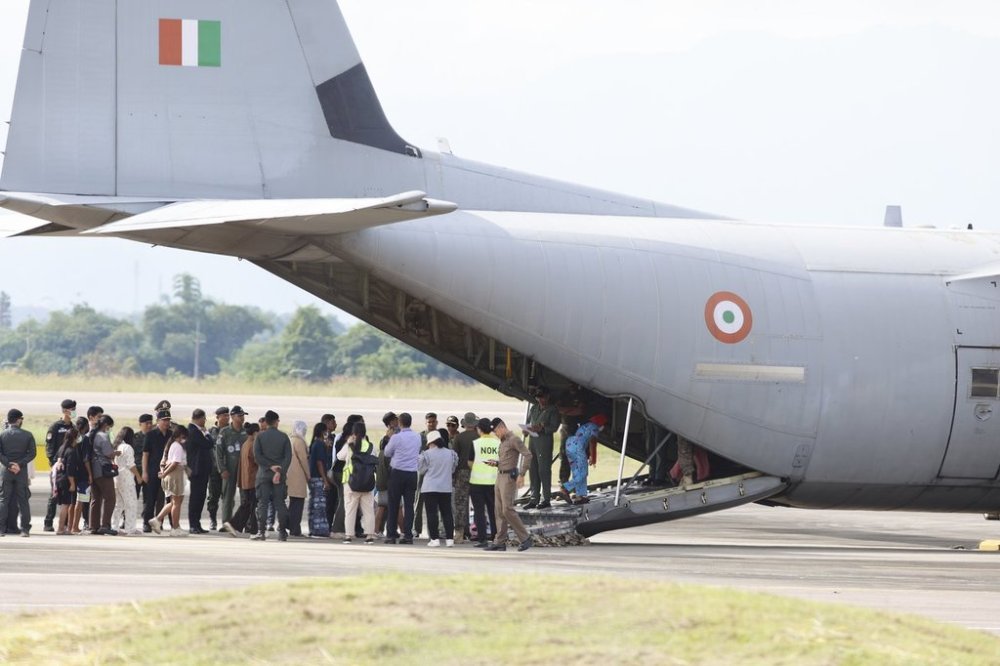Indians who fled a Myanmar cyberscam center are being flown home from Thailand
Advertisement
Read this article for free:
or
Already have an account? Log in here »
To continue reading, please subscribe:
Monthly Digital Subscription
$0 for the first 4 weeks*
- Enjoy unlimited reading on winnipegfreepress.com
- Read the E-Edition, our digital replica newspaper
- Access News Break, our award-winning app
- Play interactive puzzles
*No charge for 4 weeks then price increases to the regular rate of $19.00 plus GST every four weeks. Offer available to new and qualified returning subscribers only. Cancel any time.
Monthly Digital Subscription
$4.75/week*
- Enjoy unlimited reading on winnipegfreepress.com
- Read the E-Edition, our digital replica newspaper
- Access News Break, our award-winning app
- Play interactive puzzles
*Billed as $19 plus GST every four weeks. Cancel any time.
To continue reading, please subscribe:
Add Free Press access to your Brandon Sun subscription for only an additional
$1 for the first 4 weeks*
*Your next subscription payment will increase by $1.00 and you will be charged $16.99 plus GST for four weeks. After four weeks, your payment will increase to $23.99 plus GST every four weeks.
Read unlimited articles for free today:
or
Already have an account? Log in here »
MAE SOT, Thailand (AP) — India is repatriating on Thursday the first batch of hundreds of its nationals who last month fled to Thailand from Myanmar, where most had been working at a notorious center for online scams.
The center, known as KK Park on the outskirts of the border city of Myawaddy and said to house a major cybercrime operation, was raided by Myanmar’s army in mid-October to suppress cross-border online scams and illegal gambling.
An Indian air force transport plane left Thailand en route to India and another plane was to leave later in the day, with about 270 out of 465 Indians who are to be repatriated. The remainder will leave Thailand next Monday, according to Maj. Gen. Maitree Chupreecha, commander of the Thai army’s northern region Naresuan Task Force.

In March, India repatriated 549 nationals after an earlier crackdown on cybercrime operations at the Myanmar-Thai border.
Those currently being repatriated are among more than 1,500 people from 28 nations who fled the raid in Myawaddy. Across the border in the Thai town of Mae Sot, Thai authorities had set up temporary facilities for housing and processing not just Indians, but also Chinese, Filipinos, Vietnamese, Ethiopians and Kenyans, among other nationalities.
In April, the U.N. Office on Drugs and Crime estimated that hundreds of industrial-scale scam centers generate just under $40 billion in annual profits.
Southeast Asia is the world epicenter for online scams, and hundreds of thousands of people are believed to have been lured to work in Myanmar, Cambodia and Laos, where many were forced to perpetrate global scams involving false romances, fraudulent investments, and illegal gambling.
Human trafficking is another major criminal aspect of such operations as many of the workers were recruited under false pretenses offering legitimate jobs, only to find themselves trapped in virtual slavery.
State media in military-run Myanmar said the raid on KK Park was part of operations starting in early September to suppress cross-border online scams and illegal gambling. Since the raid, witnesses and the Thai army have said that that parts of KK Park were demolished by explosions.
However, independent Myanmar media, including The Irrawaddy, an online news service, have reported that organized criminal scams in Myanmar continue to operate in the Myawaddy area.
The cybercrime problem received major attention last month when the United States and Britain enacted sanctions against organizers of a major Cambodian cyberscam gang, and its alleged ringleader was indicted by a U.S. federal court in New York.
In South Korea, the case of a young man, killed after apparently being lured to work at a cyberscam operation in Cambodia, caused an uproar.

